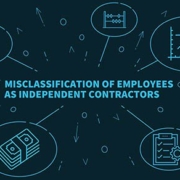Using an S Corporation May Help Business Owners Reduce Tax
- Learn the basics of self-employment tax.
- Find out how an S corporation can reduce your tax bill.
- Find out how a "reasonable wage" can impact your taxes.
- Discover the complications of converting from a C to an S corporation.
If you're a business owner, there may be a way to cut your tax bill by using an S corporation. Do you conduct your business as a sole proprietorship or as a wholly owned limited liability company (LLC)? If so, you’re subject to both income tax and self-employment taxes. If you're looking to reduce your tax bill, Fiducial has the scoop on how using an S corporation may help.
Self-employment tax and S corporations
The self-employment tax is imposed on 92.35% of self-employment income at a 12.4% rate for Social Security up to a certain maximum ($137,700 for 2020) and at a 2.9% rate for Medicare. No maximum tax limit applies to the Medicare tax. An additional 0.9% Medicare tax is imposed on income exceeding $250,000 for married couples ($125,000 for married persons filing separately) and $200,000 in all other cases.
If you conduct your business as a partnership in which you’re a general partner, there's more to know. In addition to income tax, you are subject to the self-employment tax on your distributive share of the partnership’s income. On the other hand, if you conduct your business as an S corporation, you’ll still be subject to income tax; you won't, however, be subject to self-employment tax on your share of the S corporation’s income. That could be a big benefit tax-wise.
An S corporation isn’t subject to tax at the corporate level. Instead, the corporation’s items of income, gain, loss and deduction are passed through to the shareholders. However, the income passed through to the shareholder isn’t treated as self-employment income. So, by using an S corporation, you may be able to avoid self-employment income tax.

Salary must be reasonable
However, be aware that the IRS requires that the S corporation pay you reasonable compensation for your services to the business. The compensation is treated as wages subject to employment tax (split evenly between the corporation and the employee), which is equivalent to the self-employment tax. If the S corporation doesn’t pay you reasonable compensation for your services, the IRS may treat a portion of the S corporation's distributions to you as wages and impose Social Security taxes on the amount it considers wages.
There’s no simple formula regarding what is considered reasonable compensation. Presumably, reasonable compensation is the amount that unrelated employers would pay for comparable services under similar circumstances. There are many factors that should be taken into account in making this determination. Your Fiducial rep can explain this process and discuss it with you further.
Converting from a C to an S corporation
There can be complications if you convert a C corporation to an S corporation. A “built-in gains tax” may apply when appreciated assets held by the C corporation at the time of the conversion are subsequently disposed of. However, there may be ways to minimize its impact, and Fiducial can walk you through those options.
As explained above, an S corporation isn’t normally subject to tax. However, when a C corporation converts to S corporation status, the tax law imposes a tax at the highest corporate rate (21%) on the net built-in gains of the corporation. The idea is to prevent the use of an S election to escape tax at the corporate level on the appreciation that occurred while the corporation was a C corporation. This tax is imposed when the built-in gains are recognized (in other words, when the appreciated assets are sold or otherwise disposed of) during the five-year period after the S election takes effect (referred to as the “recognition period”).
Consider all issues
Contact Fiducial if you’d like to discuss the factors involved in conducting your business as an S corporation. Your Fiducial representative will be sure to discuss the built-in gains tax and how much the business should pay you as compensation. We can look at your overall situation and advise you on the best way forward.
Make an appointment at one of our office locations or call Fiducial at 1-866-FIDUCIAL. Ready to book an appointment now? Click here. Know someone who might need our services? We love referrals!









